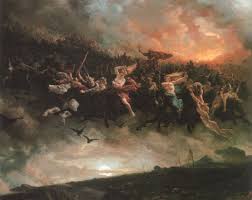Norse

adj. 挪威人的;挪威的;斯堪的纳维亚语的
n. 挪威人;挪威语
adj.
挪威人的;
n.
挪威人(语);
英英释义
Norse[ nɔ:s ]
n.
an inhabitant of Scandinavia
同义词:ScandinavianNorthman
a native or inhabitant of Norway
同义词:NorwegianNorseman
the northern family of Germanic languages that are spoken in Scandinavia and Iceland
同义词:ScandinavianScandinavian languageNordicNorth GermanicNorth Germanic language
adj.
of or relating to Scandinavia or its peoples or cultures
同义词:Scandinavian
of or relating to Norway or its people or culture or language
同义词:Norwegian
词组短语
old norse n. 古斯堪的那维亚语
权威例句
The Norse god of autophagyNorse Openmindedness and the Discovery of Vinland
The NORSE (new-onset refractory status epilepticus) syndrome: defining a disease entity.
Tephrochronology, Environmental Change and the Norse Settlement of Iceland
Interdisciplinary investigations of the end of the Norse Western Settlement in Greenland
Norse Greenland settlement: reflections on climate change, trade, and the contrasting fates of human settlements in the North Atlant...
Two millennia of North Atlantic seasonality and implications for Norse colonies
Sr Isotope Evidence for Population Movement Within the Hebridean Norse Community of NW Scotland
mtDna and the islands of the North Atlantic: estimating the proportions of Norse and Gaelic ancestry.
Bioarchaeological and Climatological Evidence for the Fate of Norse Farmers in Medieval Greenland Repository Citation
Norse (n.)
1590s, "a Norwegian," from obsolete Dutch Noorsch (adj.) "Norwegian," from noordsch "northern, nordic," from noord "north" (see north). Also in some cases borrowed from cognate Danish or Norwegian norsk. As a language, from 1680s. Old Norse attested from 1844. An Old English word for "a Norwegian" was Norðman. As an adjective from 1768. In Old French, Norois as a noun meant "a Norse, Norseman," also "action worth of a man from the North (i.e. usually considered as deceitful)" [Hindley, et. al.]; as an adjective it meant "northern, Norse, Norwegian," also "proud, fierce, fiery, strong."
1. At last the Norse yoke was broken by two remarkable men.
挪威人的桎梏最终被两个杰出的人物所粉碎。
-- 来源 -- 英汉 - 辞典例句
2. (Norse mythology) one of a race of giants often in conflict with the Aesir.
(挪威神话)经常和以奥丁为首的诸神有冲突的巨人族。
-- 来源 -- 汉英 - 翻译参考
3. The population of Norse towns turned Christian.
挪威城镇里的居民开始变成了基督教徒。
-- 来源 -- 英汉 - 辞典例句
4. Akin To: Old Norse dengja.
AkinTo:古斯堪的纳维亚语dengja。
-- 来源 -- 英汉 - 短句参考
5. Norse myths and legends
古代斯堪的纳维亚神话和传奇.
-- 来源 -- 汉英 - 翻译参考
6. (Norse mythology) a wonderful smith; identified with Anglo-Saxon Wayland and Teutonic Wieland.
(挪威神话)一个了不起的工匠;与昂格鲁-撒克逊的韦兰和日尔曼的维兰等同。
-- 来源 -- 汉英 - 翻译参考
7. The river Gi611--the Norse Styx- surrounded this lower world on every side.
地狱四周环绕着冥河吉奥尔。
-- 来源 -- 汉英 - 翻译参考
8. And in the 9th century Old Norse was carried far westward to Iceland.
在9世纪,古斯堪的纳维亚语往西发展至冰岛。
-- 来源 -- life - 汉英
9. (European mythology) a supernatural smith and king of the elves; identified with Norse Volund.
(欧洲神话)神奇的铁匠精灵的国王;与挪威的沃兰等同。
-- 来源 -- 汉英 - 翻译参考
10. The heavenly residence of the Norse gods and slain heroes of war.
仙宫,诸神居所北欧诸神和战争中被杀的英雄的仙宫
-- 来源 -- 英汉 - 短句参考
